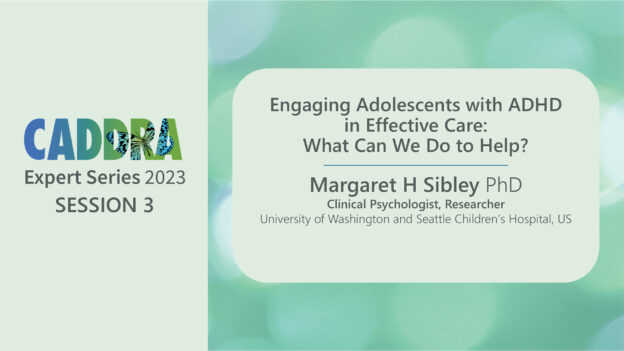CADDRA Expert Series 2023 Session 3: Engaging Adolescents with ADHD in Effective Care: What Can We Do to Help?
1. Describe developmental considerations in the treatment of ADHD in adolescence.
2. Recognize evidence-based treatment models for ADHD in adolescence.
3. Apply age-specific engagement strategies when providing care to an adolescent with ADHD.
4. Consider combinations of pharmacological and non-pharmacological treatments.
Objectives: There is an age-based disparity in the delivery of pediatric ADHD treatments with adolescents receiving far fewer services than children (Bussing et al., 2011; Danielson et al., 2018). Families of teens with ADHD often experience barriers to successful engagement in treatment that include parent and teen motivation deficits, logistical barriers, parent-teen conflict, and negative beliefs about treatment.
Methods: In this presentation, we will provide an overview of evidence-based treatments for adolescent ADHD. We will discuss important developmental considerations for adolescents and age-specific engagement strategies in the context of pharmacological and non-pharmacological treatments. Special attention will be given to non-pharmacological treatment models in terms of their common elements and combination with medication.
Results: We will review key engagement strategies for adolescents with ADHD and discuss recent longitudinal findings on the complementary effects of medication and evidence-based psychosocial treatment. These findings are from the ADHD Teen Integrative Data Analysis Longitudinal (ADHD-TIDAL) study (N=854; Sibley et al., 2021), a recent randomized clinical trial (RCT; N=278) of evidence-based behavior therapy compared to community-based usual care (Sibley et al., 2020), and four-year follow-up of an RCT of behavior therapy for adolescents with ADHD (N=325; Sibley et al., 2020).
Conclusions: I will summarize key goals when treating teenagers with ADHD and discuss why adolescence is a window of opportunity for promoting long-term effects. I will share information about delivering treatment via telehealth and how clinicians can promote the transition to young adulthood, sharing resources with attendees to promote application of the presented material.
 Margaret (Maggie) Sibley, Ph.D. is an Associate Professor of Psychiatry & Behavioral Sciences at the University of Washington School of Medicine and a researcher and practicing psychologist Seattle Children’s Hospital.
Margaret (Maggie) Sibley, Ph.D. is an Associate Professor of Psychiatry & Behavioral Sciences at the University of Washington School of Medicine and a researcher and practicing psychologist Seattle Children’s Hospital.
Her research focuses on the diagnosis and treatment of ADHD in adolescents and young adults. Her research is funded by the National Institute of Mental Health and Institute of Education Sciences-funded work and focuses on adapting non-pharmacological interventions for ADHD to under-resourced school and community contexts, with a focus on patient engagement. She serves on the professional advisory board of CHADD, the editorial advisory board of Attention magazine, and is currently an Associate Editor of the Journal of Attention Disorders as well as the secretary of the American Professional Society of ADHD and Related Disorders. She is a member of the Multimodal Treatment of ADHD (MTA) Cooperative Group and the author of a book on treating ADHD in adolescents (2016, Guilford Press). She has authored or co-authored over 100 scholarly publications on ADHD in adolescence and young adulthood.
CADDRA – Canadian ADHD Resource Alliance has been approved by the College of Family Physicians, the Royal College of Physicians and Surgeons of Canada and the Canadian Psychological Association to offer 1 continuing education credits for this session. CADDRA maintains responsibility for the program. Participation in a discussion forum and completion of a reflective exercise are required for certification.
Course Content

